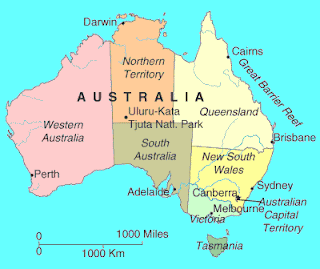Salsta's Tomatoes
(Image © Sally E.)
As I write this blog post, I still have the scent of complete fertiliser on my hands from the gardening I was at a half an hour ago. Tonight it was just transplanting some capsicums/red bell peppers to a sunnier location to get them to grow a bit better than they have been so far.
I started the vegetable garden this year just with the idea that it might please my mother, who has Alzheimer’s disease, to see them grow. When I brought the first seedlings home, and again when I got some tomatoes going from seed (from particularly tasty tomatoes from the supermarket), I was rewarded with the sort of whole face grin normally seen in toddlers when they learn a new skill.
Now however, as well as providing fresh, tasty, seasonal produce fresh from the garden, it seems like these vegetables will give me a strong economic benefit as well. They’ll give many kilograms of food for the cost of a few seedlings, a handful of fertiliser, some sunshine and a little water.
With floods of up to 22 metres across an area of Queensland as big as France and Germany combined, I have no doubt that the price of vegetables in our oligopolistic Australian supermarkets will rise in a meteoric fashion. When there was a cyclone that wiped out the Queensland banana crop a few years ago, they put the price of all fruit up and bananas became a status symbol. There was no banana cake on the Australian menu for a couple of years and I suspect it’s about to go off the menu yet again. Fortunately I have a couple in the freezer. Although, earlier I read that that is one crop that may not go up significantly in cost this year.
Flooding in Australia
(Image Credit: Shairon Paterson for the Salvation Army IHQ courtesy of Pipeline)
Australia also has floods in NSW at present, with Victoria and Tasmania posting flood warnings as this post is published. We’ve had floods in food producing areas of Victoria twice in recent months. After 13 years of drought it’s somewhat of a relief, though the best crops in 15 years are now being badly damaged and for farmers who have no subsidies that’s a serious economic issue for them, as well as for the economy as a whole.
At this farm at Wycheproof, in northern Victoria, the drought seemed to break last year, but the wheat crop failed for want of follow-up rain
(Attribution unknown, found here)
It’s been so dry in Victoria (perhaps you remember last year’s bushfires) that even these floods are not drought breaking. After so much rain there’s still barely more than 50% of water in our dams and the population of Melbourne is growing rapidly, largely by political policy. After the 26% or capacity of a year or so ago, 53.8% sounds like a lot to us now but it’s still not a lot in storage in a state where the rainfall we used to be able to rely on has mainly shifted south into Bass Straight in line with climate change forecasting and the storages are relatively small as they were built with that reliability in mind. Melbournians currently use only 142 litres of water per person per day. To people in other developed nations that must seem miniscule but compared with undeveloped nations it’s luxurious. We still flush our toilets with potable water after all.
It’s all very reminiscent of a poem called My Country written by Dorothea Mackellar more than a century ago, which somehow moves me every time I read it:
I love a sunburnt country,
A land of sweeping plains,
Of ragged mountain ranges,
Of droughts and flooding rains.
Australia can seem a harsh land but it’s vibrant in people and land, one of Oprahs’ recent guests here reported to have said that visiting here is like stepping from black and white into colour. With all of what seems to be a packet of harsh weather being delivered at present, the people in Queensland are still exceptionally lucky when compared with the Pakistani flood victims of last year in the following ways.
· ❧ Convoys of food are being trucked in and flown by helicopter. There’s no chance that they’ll be stopped because they will be attacked on delivery.
· ❧ Many people are able to stay with relatives, who are wealthy enough to keep them safe until the floods recede and their homes are again safe.
· ❧ Those who cannot stay with relatives are being housed in solid communal shelters and the red cross is doing what they do in times of crisis, cooking for the masses as required, so there’s no chance of them going hungry.
· ❧ Though wet, the weather is comparatively mild. There is no harsh winter closing in.
· ❧ Though with sewerage plants flooded, there is a chance of water borne disease and the floodwaters will breed mosquitoes so Dengue Fever could break out, the population is well educated and most can swim, so public education is keeping most people as safe as can be barring acts is foolishness such as the teenagers who floated 15 km downstream on air-mattresses.
· Our military has been deployed to help and with only a few tens of thousands needing it, rather than 20 million, everyone who need help will get it.
· Australia is already making hardship payments available to people displaced by the floods.
To return to my original point, I will get very good value now for the water used in the garden this year. However it is a precious resource that must be respected, protected and appreciated for what it’s worth.
Water is eternal. The water on Earth was created long before the Earth itself. We cannot create more of it and when nature decides to play us with it there’s not a lot we can do but clean up afterwards. It’s been suggested that the next wars will be fought over water and given the difficulties managing it between the states in Australia, the US, the further difficulties when it’s an international matter, such as with the Mekong or Nile rivers and the level of importance of water in the volatile Middle East, it’s an easy thing to imagine.
I believe that we need to live within our most limiting means. In the case of Victoria that involves being still more water efficient than we are now and given the further pressures on water worldwide no doubt that’ll become a more widespread need, probably more quickly than people expect. Benjamin Franklin once said “When the well is dry, we learn the worth of water.”
Laanecorie Reservoir, Victoria Australia
Thank you Sally for sharing your thoughts...
Readers can contribute to the Queensland State Flood Fund at:
To help those across Australia, since more states are currently being affected, you can contribute to the Australian Red Cross at:
Flooding in Brisbane, Queensland, Australia
(Image credit: Australia Red Cross)
Man rescuing a kangaroo, Ipswich, near Brisbane, Queensland, Australia
(Image credit: BBC News Service)
© Bright Nepenthe, 2011





























No comments:
Post a Comment